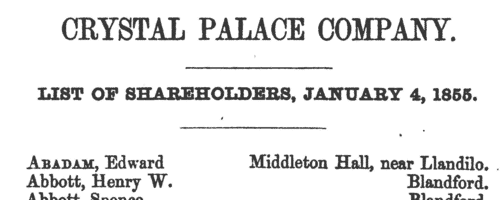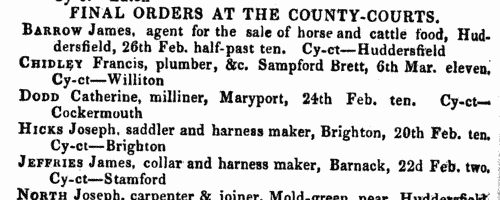Our indexes include entries for the spelling kirkland. In the period you have requested, we have the following 314 records (displaying 141 to 150):
Scottish Partnerships Dissolved and Trustees of Bankrupts
(1855)
Trading partnerships dissolved in Scotland, and appointment of trustees for Scotch Sequestrations: business failure and bankruptcy often caused people to restart their lives elsewhere, so these are an important source for lost links
| Sample scan, click to enlarge

|
Unclaimed Dividends
(1855)
The unclaimed dividend books of the Bank of England, containing names and descriptions of over 20,000 persons entitled to many millions of pounds accumulated in the bank unclaimed during the 18th and 19th centuries, mostly in consols and annuities, and transferred to the Commissioners for the Reduction of the National Debt.
| Sample scan, click to enlarge

|
Crystal Palace Company Shareholders
(1856)
The management of the Crystal Palace, built for the Great Exhibition of 1851, was restructured by a Deed of Settlement in 1852, and then incorporated as the Crystal Palace Company by royal charter in January 1853. This alphabetical list of shareholders was published in January 1856. | Sample scan, click to enlarge

|
Dissolutions of Partnerships
(1856)
Trade partnerships dissolved, or the removal of one partner from a partnership of several traders, in England and Wales
| Sample scan, click to enlarge

|
Gentry in London
(1856)
The Post Office London Directory for 1856 includes this 'Court Directory', listing alphabetically by surname and christian name the upper class residents of the capital with their postal addresses. 'In order to afford space for the addresses, the abbreviation "esq." for esquire has no longer been appended to each name in the Court Directory. It should be understood that such should be added to the name of every gentleman in the following pages to which no inconsistent addition is affixed.' Decorations, honours &c. are generally given. Some gentlemen appear who are also listed (as professional men, &c.) in the commercial section. Those with second residences in the provinces usually have the country address given as well. | Sample scan, click to enlarge

|
Traders and professionals in London
(1856)
The Post Office London Directory for 1856 includes this 'Commercial and Professional Directory', recording over 100,000 individuals. | Sample scan, click to enlarge

|
Insolvents
(1857)
Insolvency notices for England and Wales: insolvency often caused people to restart their lives elsewhere, so these are an important source for lost links | Sample scan, click to enlarge

|
Scottish Partnerships Dissolved and Bankruptcy Proceedings
(1857)
Dissolutions of business partnerships, and proceedings in bankruptcy in Scotland | Sample scan, click to enlarge

|
Insolvents in England and Wales
(1858)
Perry's Bankrupt and Insolvent Gazette, issued monthly, included lists of insolvencies and stages in the process whereby the insolvents petitioned for release from debtors' prison. The insolvent is generally referred to by name (surname first), address and trade. This is the index to the names of the insolvents, from the issues from January to December 1858. | Sample scan, click to enlarge

|
Members of the Sussex Archaeological Society
(1858)
"We may fairly ascribe the origin of the Society to the discovery, in the autumn of 1845, of the remains of Gundrada and De Warenne at Lewes Priory. That remarkable exhumation of the illustrious and long-buried dead, excited a deep and long-sustained interest, not only in the history of those noble personages, but also in the annals of the monastery they had founded, and in many cognate but hitherto much-neglected matters of research." By 1858 the membership had risen to about 550, and the tenth volume of Sussex Archaeological Collections had been published. The membership list gives christian name or initials and surname, and address. An asterisk prefixed to a name denotes a Life Compounder. | Sample scan, click to enlarge

|
Research your ancestry, family history, genealogy and one-name study by direct access to original records and archives indexed by surname.











